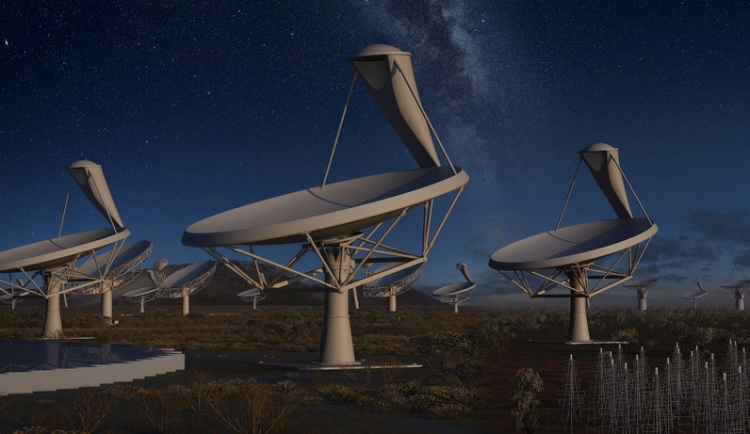SKA Project Positions Africa as a Global Leader in Astronomy and Innovation
“Today, we stand on sacred ground, not only for its pristine, radio-quiet skies, but for its role in uniting nations to explore the mysteries of the universe,” Nzimande said.

- Country:
- South Africa
The Square Kilometre Array (SKA) project is more than just a telescope—it is a transformative scientific initiative that places Africa at the forefront of global astronomy, providing a platform to answer humanity’s deepest questions about our origins, the cosmos, and our place within it.
Speaking at the G20 SKA Ministerial Event in the historic Karoo region of the Northern Cape, South Africa’s Minister of Science, Technology, and Innovation, Professor Blade Nzimande, described the SKA as a symbol of unity and scientific ambition.
“Today, we stand on sacred ground, not only for its pristine, radio-quiet skies, but for its role in uniting nations to explore the mysteries of the universe,” Nzimande said.
South Africa’s Leadership in Astronomy
Over the past two decades, South Africa has invested heavily in large-scale scientific infrastructure, positioning itself as a leader in astronomy. Projects such as the MeerKAT telescope—a precursor to the SKA-Mid—have already yielded more than 500 peer-reviewed scientific publications, contributing to groundbreaking discoveries about the Milky Way, black holes, and cosmic evolution.
Nzimande said astronomy has been a strategic priority for government, not only advancing science but also strengthening science diplomacy. The SKA reflects this vision, with South Africa hosting the central core of the SKA-Mid project and spearheading efforts to protect the radio-quiet zone in the Karoo, ensuring minimal interference for sensitive observations.
Catalysing Human Development and Jobs
Beyond its scientific mission, the SKA has become a catalyst for human capital development. Training programmes linked to the project are nurturing the next generation of African scientists, engineers, and data specialists.
Since the construction of the MeerKAT began, the initiative has created over 8,800 direct and indirect jobs in the Karoo, offering opportunities for local communities. Investments of R288 million with local suppliers and the hiring of local residents for SKA-Mid construction have contributed to regional economic growth. Small businesses have also flourished, with R121.5 million distributed through financial assistance programmes.
Pan-African Collaboration
The SKA is not confined to South Africa. The initiative has expanded across the continent, with eight African partner countries receiving grants to establish astronomy programmes, helping to create a pan-African scientific community. These partnerships are ensuring that Africa is not only a host to the SKA but also a key contributor to the science it will generate.
“The SKA project is a catalyst for developing the next generation of scientists and engineers. It positions Africa as an active participant in shaping humanity’s cosmic narrative,” Nzimande said.
First Steps in Construction
The project is progressing steadily, with the first four SKA dishes currently undergoing rigorous testing. Once completed, the SKA will be the world’s most powerful radio telescope, capable of producing data on an unprecedented scale. It will allow astronomers to study the formation of the first stars and galaxies, test theories of gravity, and even search for signs of extraterrestrial life.
Nzimande compared the SKA’s significance to humanity’s greatest scientific milestones: “Our journey in astronomy stretches from the early observatories to MeerKAT and now to SKA-Mid. This is a testament to Africa’s ability to drive global discovery.”
International Collaboration
The G20 SKA Ministerial Event drew science and innovation ministers, ambassadors, and representatives from more than 30 nations, highlighting the SKA’s role as a global scientific partnership. The event, hosted by the Department of Science, Technology, and Innovation (DSTI) alongside the South African Radio Astronomy Observatory (SARAO), underlined the project’s capacity to inspire collaboration across borders.
Nzimande described the gathering as a reminder of what shared ambition can achieve. “This event is a testament to what humanity can achieve through vision and collaboration. The SKA is not only about science—it is about building a future of shared knowledge and innovation.”
Africa’s Role in Shaping the Future
With the African Continental Free Trade Area creating opportunities for cross-border collaboration, and South Africa’s infrastructure and scientific capacity strengthening, the SKA positions the continent as a global hub for high-tech innovation, data science, and advanced engineering.
As the world looks to the stars, the SKA is ensuring that Africa is not just a spectator but a leading voice in humanity’s exploration of the universe.










